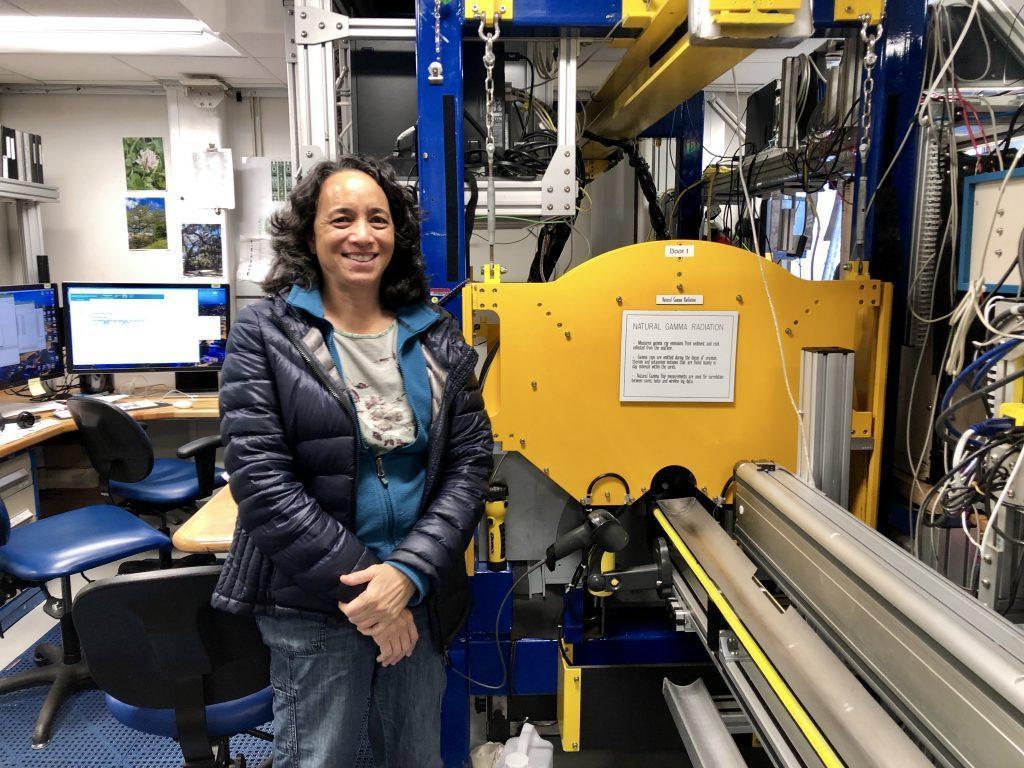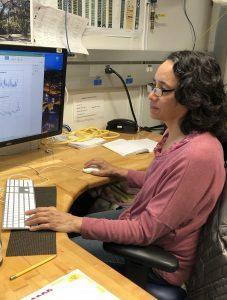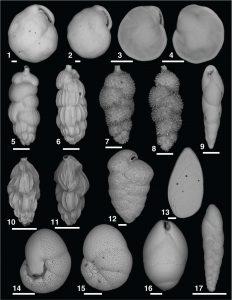
Career Spotlight: Stratigraphic Correlator Christina Ravelo

-Worked on the JR before: Yes
Christina Ravelo Interview
Please describe your job duties while on the JR. What will you be doing on a daily basis?
-
-
-
-
-
-
-
-
- I will be using density, magnetic susceptibility and natural gamma radiation data to make tie points between holes at each site, and to design a sampling plan that will ensure that we have stratigraphic continuity.
-
-
-
-
-
-
-
Describe one instrument or tool that is essential for you to do your job? Or a piece of equipment on the JR that is useful and why – what does it do?
-
-
-
-
-
-
-
-
- Actually, all the tools are important, but probably the most important is the drilling equipment! Without that, there’d be no samples. I think most of us are out here for the samples, and the equipment onboard give us lots of preliminary information about the cores and the samples, and gives us a really good idea of what we got while drilling. That helps us know what we want to study when we get into our labs onshore.
-
-
-
-
-
-
-
Why is your work (or research) important? What question are you trying to answer or how does your work/research help assist/advance scientific knowledge?
- Much of the science that is being done on this expedition require continuous records, meaning that the records have no gaps (no missing time), so my job is important for ensuring that the science party can generate continuous records. After the cruise, I will work on helping to fulfill the science objectives of this expedition.

Why the ocean? What made you choose a career at sea or career that involves the ocean?
- Fascination of how the ocean and climate works, and also fascination of science in general. Oceanography is one of the most interdisciplinary fields of science, and I really liked being able to draw on basic knowledge of math, physics, chemistry and biology; oceanography is a combination of these things and appealed to me for this reason.
What are you most excited about for this expedition and/or being on the JR?
- Getting great samples to study the ocean and climate of the Pliocene.
What are three things you think are needed for a successful expedition at sea? And Why!
- The the awesome drilling equipment of the JR is absolutely needed. And the skilled people (crew, drillers and technicians) are absolutely needed. And, of course, you need creative and well-informed scientists that design the project and come up with important questions to answer.
If you could answer one question about our Earth – what would it be and why?
- What is the Earth’s environment going to be like 100 years from now, and how can we effectively prepare for those conditions?

What is your favorite sea creature and why?
-
-
-
-
-
-
-
-
- A foraminifera because they hold a huge amount of information about the ocean’s past conditions.
-
-
-
-
-
-
-
When did you know you wanted to pursue a career in science or an ocean science career?
-
-
-
-
-
-
-
-
- I wanted to be a scientist when I was in high school, and I knew I wanted to be an oceanographer in college.
-
-
-
-
-
-
-
What do you personally hope to gain or experience while on EXP383?
-
-
-
-
-
-
-
-
- Participation in interdisciplinary science with an international science party.
-
-
-
-
-
-
-
What message do you have for anyone considering a career at sea or a career involving the ocean sciences?
-
-
-
-
-
-
-
-
- Go for it!
-
-
-
-
-
-
-
What do you do back home when not on the JR?
- I’m a professor of oceanography at the University of California, Santa Cruz, and I do lots of things related to being a mother, wife, and daughter.
Do you get sea sick? If yes or sometimes, please also select the other tab and describe how you cope with it.
- No
The need for space comes in many forms. Which type of space, in general, is the most important to you?
- _X_Personal Space
- ___Creative Space
- ___Outdoor Space
- _X_Emotional Space
- ___Physical Space
- ___Spiritual or Meditative
- ___Outer Space
- ___Community Space
- ___Quite Space
- ___Productive/Work Space
- ___Digital/Virtual Space
- ___Public Space
- ___Inner Space
- ___Other:
Why that type of space? What makes it important to you and will it be available while on the JR?
- Two months at sea can be challenging, and I don’t like being around people all the time, so having personal and emotional space is important to me. I’m here to work, so having good productive/work space is also important.